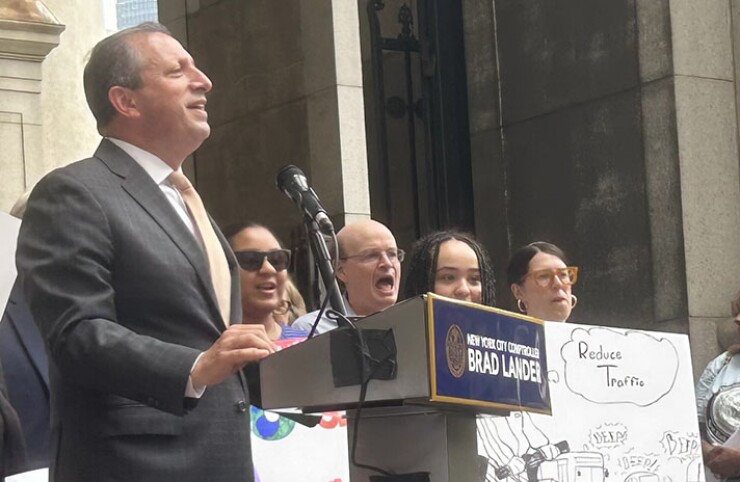A coalition organized by New York City Comptroller Brad Lander has filed three lawsuits to allow the launch of congestion pricing.
Lander and his allies hope the lawsuits will force the defendants — New York Gov. Kathy Hochul, state Department of Transportation Commissioner Marie Therese Dominguez, and the Metropolitan Transportation Authority — to begin the tolling program that
"When Gov. Hochul

The first of the lawsuits has already resulted in an injunction and arguments on the second two cases may begin as soon as September.
The comptroller is not a plaintiff in any of the suits, but is organizing the plaintiffs and legal experts, including transit riders, labor, environmental and disability advocates, and residents of the Central Business District. The legal working group is researching additional lawsuits and amicus briefs, Lander said at a press conference on Thursday.
The congestion pricing plan, which was supposed to take effect on June 30, would have charged most vehicles a fee to enter the CBD. The revenue from those tolls — around $1 billion per year — was supposed to fund half of the remainder of MTA's 2020-2024 capital plan.
The MTA created the plan according to the 2019 MTA Reform and Traffic Mobility Act. The first of two lawsuits filed Thursday, City Club of New York et al v. Hochul, argues that Hochul's "indefinite pause" on the plan violated that law.
The law does not give the MTA permission to implement the tolls, but instead says the agency "shall" do so. It does not specify when the tolls must begin.
Hochul has held up the program by refusing to let her Department of Transportation sign a form of final approval from the Federal Highway Authority. Andrew G. Celli, Jr., an attorney representing the plaintiffs, called Hochul's maneuver a "bureaucratic trick."
"[The law] doesn't say that Gov. Hochul is the official in charge of congestion pricing. She isn't — that's the [Triborough Bridge and Tunnel Authority]. It doesn't say that she's in charge of when congestion pricing begins. She isn't — that's the MTA," Celli said.
The MTA has a similar interpretation of the law, and passed a resolution at its last
The second of the two lawsuits filed Thursday, Riders Alliance v. Hochul, argues that Hochul is violating New York State environmental laws by delaying congestion pricing. The Riders Alliance, the Sierra Club and New York City Environmental Justice Alliance are plaintiffs in the lawsuit, and Earthjustice is serving as counsel.
New York's environmental review for congestion pricing, which was
New York's Climate Leadership and Community Protection Act requires the state to lower greenhouse gas emissions 40% by 2030 and "requires executive branch officials to ensure their decisions help achieve" those reductions, the lawsuit said. The act specifically mentioned congestion pricing as part of the state's strategy to reduce emissions.
Hochul is also violating the New York State constitution, the lawsuit argues, specifically the 2021 amendment which added the right to clean air and a healthy environment to the state bill of rights.
Hochul's office released a statement on the new lawsuits, that says: "Get in line."
The statement went on to reference the
Hochul has insisted that will find another way to get the MTA $16.5 billion, although members of the MTA board and New York legislature have said they prefer the congestion pricing plan.
But even providing the alternative funds would not solve these lawsuits, since that would not implement congestion pricing, as the first lawsuit requires, or lower pollution and greenhouse gas emissions, as the second lawsuit requires.
Recently, Hochul suggested she would let the MTA implement congestion pricing if the tolls charged were lowered. That would avert the lawsuit, Celli said.
Last week, the first lawsuit in this legal strategy was filed by New York City Public Advocate Jumaane Williams and the Transport Workers Union of America Local 100. The MTA had cut bus service around July 12, presumably to manage the loss of anticipated congestion pricing revenue.
The MTA did not give the required 30 days' notice of non-emergency bus service reduction, and the suit sought an injunction to the service cuts. The State Supreme Court granted a temporary restraining order to restore the cuts ahead of the next court date in September.
The legal coalition may bring a suit on behalf of disabled subway riders, Lander said.
As part of a 2023 settlement, the MTA agreed to spend nearly 15% of its capital budget on accessibility to reach compliance with federal and state civil rights laws. Without the congestion pricing revenue, the MTA cannot build elevators in the 81 stations it committed to in the 2020-2024 capital plan.
The working group is also researching a lawsuit on behalf of MTA bondholders, although that suit is less likely, Lander said. The MTA never issued any congestion pricing revenue bonds, but if the gap in its budget affects its operations enough to threaten its finances, bondholders could have a case against Hochul and the MTA.
Some New York legislators are also part of the legal coalition and may file amicus briefs, Lander said.
New York may have a very limited window to straighten out the legal questions in the suits. The Trump administration opposed congestion pricing, and if former President Donald Trump returns to office, he could revoke federal approval for the program.
When asked about the possibility, Lander said, "There are a lot of reasons why congestion pricing needs to start immediately."





